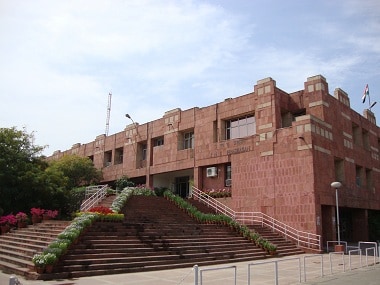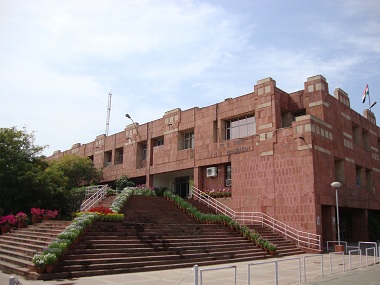On Wednesday, the executive council at Jawaharlal Nehru University, the institute’s highest decision-making body, revised the hostel fee hike which had led to massive protests from students on campus. In a press note released by the JNU administration the same day, the monthly room rent, which is currently Rs 20 and Rs 10 for double and single-occupancy respectively, was revised to Rs 300 and Rs 150, from the proposed Rs 600 and Rs 300. [caption id=“attachment_5192221” align=“alignleft” width=“380”]  File image of the JNU campus. Image credit: Official website of JNU[/caption] The refundable mess security was also slashed from the proposed Rs 12,000 to Rs 5,500. However, the contentious ‘service charges’, which will come to around Rs 1,700 per month, have been retained. For students hailing from Below Poverty Line backgrounds (BPL), a 50 percent concession was offered in the service, utility, and room charges. However, students and teachers have slammed the revised draft, alleging that the rollback is an eyewash. Assuming electricity and water charges at Rs 500 per month, and mess charges at Rs 2,500 per month, a JNU student will have to fork out Rs 60,700 per year for a double-occupancy room in the hostel. For a single-occupancy, it comes up to Rs 62,500. For a BPL student, the annual charges for the hostel under the revised plan come up to Rs 46,600. However, according to the government’s Digital India portal, only those earning less than Rs 27,000 per annum are eligible for BPL certificate. Firstpost spoke to students from across eight prominent universities and institutes to find out how much they are paying for tuition, and hostel accommodation, and found that even with the revised hostel manual, JNU would have among the highest hostel charges in the country and become the most expensive central university. Jisan Ali, a first-year student enrolled for a Master’s in economics at Jadavpur University, Kolkata, reported that he paid Rs 420 annually as hostel room rent, which comes to Rs 35 per month. The amount includes charges for electricity, water, and internet. A refundable security deposit of Rs 3,300 is charged towards the hostel mess. The mess charges, on average, come up to Rs 1,800 per month. Ali’s annual expenses for the hostel comes up to Rs 22,020, which is almost a third of what students will have to pay at JNU from the next academic year. If you study in Aligarh Muslim University, the hostel room is practically free, with no charges towards electricity, water or internet. Saad Asad, a 5th year student pursuing BA.LLB, claimed that the only charges applicable were for the mess, which was the same across all courses. “We pay Rs 1,000 per month for the mess. While the majority rooms in the hostel are double occupancy, the PhD students get single rooms,” he said. At Rs 12,000 per year, AMU, which is also a central university like JNU, charges a fraction of the amount for the hostel. At Madras University, Aadhavan P, a PhD student in the Department of English, revealed that he paid an annual hostel rent of Rs 4,750, or Rs 395 per month, which includes the charges for electricity. The mess fee came up to Rs 2,500 per month. “In all we pay Rs 34,750 per year for the hostel,” said Aadhavan. In Delhi’s Jamia Millia Islamia University, Sadiya Khan, a first year MA student in the Conflict Analysis and Peace Building programme, paid Rs 32,000 annually for her hostel in the old campus. It included the charges for the mess, electricity, water, and internet. Sadiya said she can pay the fees in two installments. The hostel has study rooms, a gymnasium, TV room, and laundry facilities. Malikarjun Dabbeda, a second year Master’s student in History at the University of Hyderabad, said his hostel rent was Rs 500 per semester {the student had earlier said hostel rent was Rs 6,000 per year, but later amended it to Rs 500}; mess charges averaged around Rs 1,500 every month, depending on actual consumption, bringing the yearly cost of the hostel to Rs 24,000. “The mess expenses for raw material is calculated every month and divided equally among the students,” Dabbeda said. A student enrolled in the B Tech course at IIT-Madras, speaking on anonymity, said that the course fee at the premier institute depended on the income bracket and caste location of the students’ parents. The student explained that for SC/ST/Persons with disability students, as well as for those whose parents’ annual income is below Rs 1 lakh, the institute fees came up to Rs 14,000 for those opting the hostel, and Rs 7,000 for day scholars. Besides the above, the hostel charges were Rs 33,215 while the fee for day scholars was Rs 9,100 per semester. Even for those students hailing from general, Other Backward Class, and Economiacally Weaker Sections, whose parents’ annual income was above 5 lakh, the hostel charges remained the same; the only increase registered was in the institute fees. “Those with family income below Rs 9 lakh can avail an interest-free loan for five years, under the Vidyalakshmi scheme,” the student added. Bhatta Ram, president of the Student’s Union at the Tata Institute of Social Sciences, said that the hostel and electricity fees at the Mumbai-based institute was Rs 30,000 per year. The second year Master’s student said dining charges came up to Rs 32,000, bringing the total to Rs 62,000 per year, marginally lower than the revised fee for a single-occupancy room at JNU. At Delhi University’s Meghdoot Hostel for men, staying at the hostel incurs an annual cost of Rs 51,680, which includes Rs 36,000 for mess charges, and the rest for the room. At Jubilee Hall, it’s even cheaper: Rs 37,775 a year, of which Rs 1,500 is the monthly mess fee and the rest for boarding and services. However, the popular hostels such as VKRV Rao and Ambedkar-Ganguly in DU’s North Campus were more expensive. An economics student who resides in Delhi University’s Ambedkar-Ganguly Hostel in Mukherjee Nagar said she paid Rs 81,300 yearly for the hostel, which included dining, and came with laundry services, internet, an AC, a library, and a common room. “Women’s hostels are usually more expensive than men’s. Ambedkar-Ganguly, for example, has better infrastructure, and has single rooms for women,” she said, speaking on condition of anonymity. Despite reaching out to JNU registrar Pramod Kumar, Firstpost received no response.
On Wednesday, the executive council at Jawaharlal Nehru University, the institute’s highest decision-making body, revised the hostel fee hike which had led to massive protests from students on campus
Advertisement
End of Article


)

)
)
)
)
)
)
)
)



